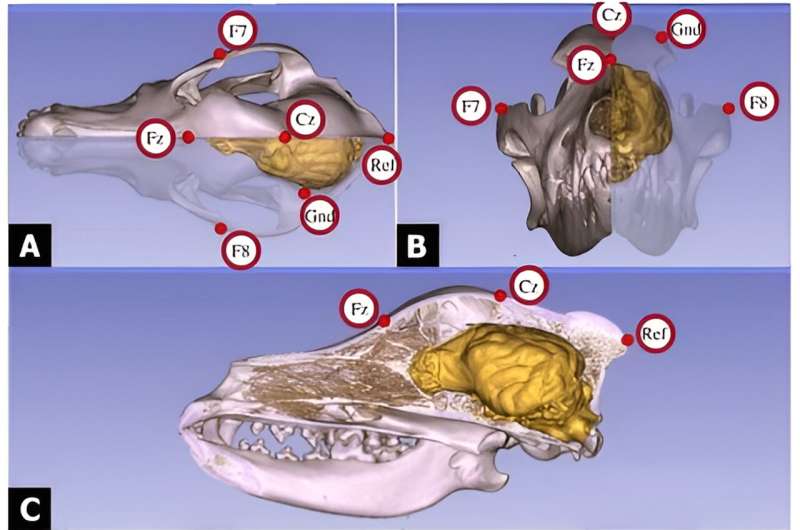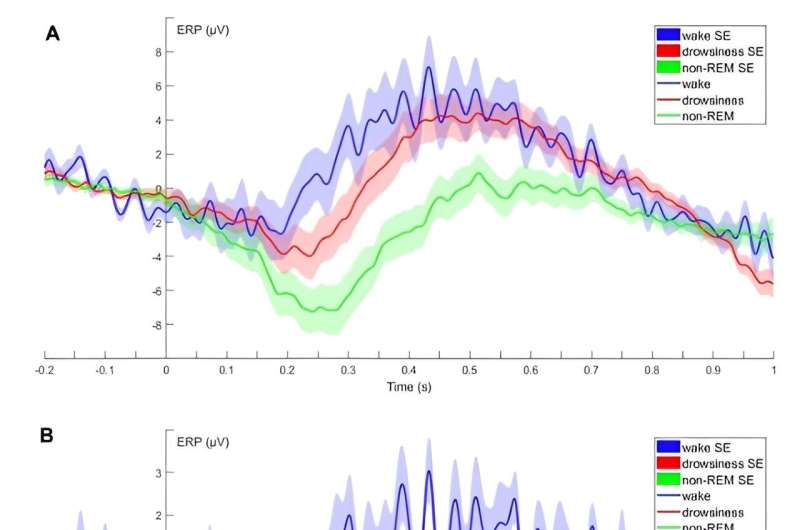September 8, 2023 feature
This article has been reviewed according to Science X's editorial process and policies. Editors have highlighted the following attributes while ensuring the content's credibility:
fact-checked
peer-reviewed publication
trusted source
proofread
Let sleeping dogs lie? New study suggests they can process vocalizations even while they snooze

Most dogs respond in specific ways to certain vocalizations, such as another dog barking or humans using certain tones of voice. Of course, this all happens while the dogs are awake.
Now, a new study suggests that they can also process vocalizations during sleep. The work, titled "Event-related potentials indicate differential neural reactivity to species and valence information in vocal stimuli in sleeping dogs," was published in Scientific Reports.
A team of researchers from ELTE Eötvös Loránd University; ELKH-ELTE Comparative Ethology Research Group; and the Research Center for Natural Sciences, Institute of Cognitive Neuroscience and Psychology, all in Budapest, Hungary, conducted a small explorative study in which they measured the event-related potentials (ERPs, a term for measurable neural responses) in family dogs to vocalizations from human family members and other dogs while the subjects were asleep.
Existing research on dog behavior supports the use of dogs as good models for studies in comparative neurobiology.
Studies have shown that much like humans, dogs in wakeful states respond with differing behaviors depending on the valence (levels of positivity and negativity) of vocalizations they hear. They can correlate vocalizations of both dogs and humans with respective facial expressions, and with appropriate pictures. Moreover, in dogs and in humans, sleep has been shown to be important for emotional processing and memory consolidation.
In this study, the researchers wanted to know whether dogs in various sleep stages would show different responses to stimuli of differing valences from different species—in this case, humans and other dogs. They hypothesized that the research subjects would show sensitivity to both, and recruited owners and dogs (sample size = 13) from the database of the Family Dog Project at Eötvös Loránd University's Department of Ethology.
The research team measured the dogs' neural responses only with surface electrodes, a painless and non-invasive EEG method. To place the electrodes, they gained the dogs' cooperation via positive reinforcement (praise and treats). Each dog was tested individually, and just before the testing began, the dog settled down for its daily nap with its owner sitting at its side.
From another room, while the dog was in states of wakefulness, drowsiness, and non-REM sleep, a research team member played recordings of non-verbal vocalizations from humans and dogs, each of which had been previously rated as having positive or neutral valence. To avoid startling or waking the dogs, no sounds of extremely negative valence were included. Each sound file lasted one second, and each was played at the same volume.

Positive vocalizations from dogs included growls, grunts, moans, pants, and whines; while neutral vocalizations included barks, grunts, moans, and yelps. From humans, positive vocalizations included general and laughing sounds; neutral included coughs, general sounds, moans, sighs, and yawns. No human verbal vocalizations were included, nor were any sounds with sexual undertones, such as sexual moans.
The intensity of the dogs' responses was recorded in milliseconds, and each testing session lasted approximately three hours. The dogs produced neural responses to each stimulus while they were awake, while they were drowsy, and during non-REM sleep, with varying intensities and slightly longer response times at each successive stage.
Despite limitations including the small study size, incomplete collection of data from some of the subjects, and a number of artifacts that did not support direct comparisons of sleep stages, the findings show clearly that ERPs can occur in dogs during states of drowsiness and non-REM sleep, and that the dogs' brains are able to process them according to species and valence factors, similar to the way humans can process certain sounds as they sleep.
"This finding is significant," the research states, "insofar as it is the first evidence of complex auditory processing during sleep in dogs."
Indeed, these results expand our knowledge of dogs' neural processing abilities and provide a basis for further studies in this area.
More information: Huba Eleőd et al, Event-related potentials indicate differential neural reactivity to species and valence information in vocal stimuli in sleeping dogs, Scientific Reports (2023). DOI: 10.1038/s41598-023-40851-w
Journal information: Scientific Reports
© 2023 Science X Network


















